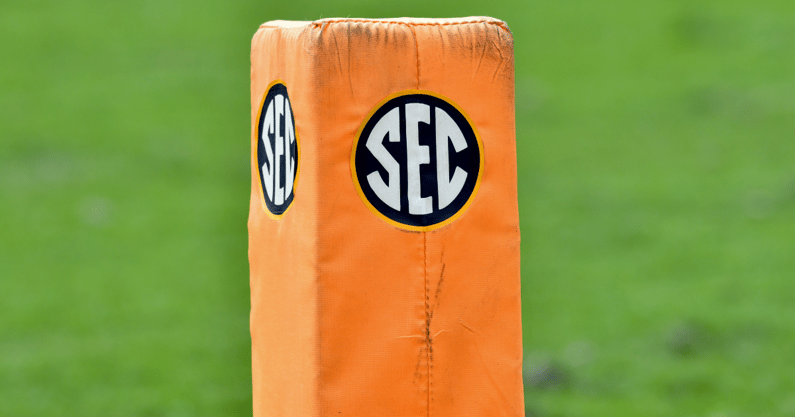College football insider on NIL: Schools are being protected by state law to do what they want

SEC spring meetings are taking place in Destin, FL this week and a few topics are at the forefront. Debate between the eight and nine-game schedule is likely the most prominent but NIL is being discussed as well. Particularly with recent development where state laws are helping out programs in a big way.
Ross Dellenger of Sports Illustrated explained schools are now protected when it comes to NIL by state laws and there is nothing higher authorities can do about it. Neither the NCAA nor the SEC can enforce NIL policies since programs are following state law, with Texas A&M being the example used.
“The latest trend is schools being protected by state law to basically do what they want,” Dellenger said during a Tuesday appearance on The Paul Finebaum Show. “There’s no NCAA enforcement or SEC enforcement for NIL rule breaking if you follow a state law. Texas had a state law, Missouri had a state law pass. Oklahoma and Arkansas.
“They all had state laws pass that basically prohibit the NCAA and SEC from enforcing some of these NIL policies and some of them are going another step. Texas A&M will operate NIL through its foundation, its fundraising arm. Every other SEC team is looking at that and probably exploring doing the same.”
On3’s Pete Nakos recently looked at the state of Oklahoma, explaining why they have a massive advantage when it comes to recruiting now. With the Sooners heading off to the SEC before the 2024 football season, it could not be better timing for head coach Brent Venables.
Top 10
- 1New
CFB Hall of Fame
2025 class announced
- 2Hot
Lou Holtz
ND legend jabs Ryan Day
- 3
CFP beer prices
Concession prices for title game
- 4Trending
Carson Beck
UGA myth dead, Bama pursued
- 5
Quinn Ewers
Texas QB declares for NFL
Get the On3 Top 10 to your inbox every morning
By clicking "Subscribe to Newsletter", I agree to On3's Privacy Notice, Terms, and use of my personal information described therein.
SEC looking for uniform NIL policy across conference’s states
A lot of conversation surrounding NIL has come back to those in Washington DC having some kind of impact. Finebaum asked Dellenger if the topic has now become a state-by-state issue, compared to being on the national scale.
“Certainly,” Dellenger said. “And maybe eventually the conference headquarters. If they can get all of the state laws to mirror one another, the conference might be able to police or enforce or oversee NIL in some way from a conference standpoint.”
Once Oklahoma joins the conference, there will be 12 states represented in the SEC. Those in Birmingham will have the tough challenge of bringing them all together for a uniform policy. Until then, each state — including several SEC ones — will be able to operate with NIL however they see fit.